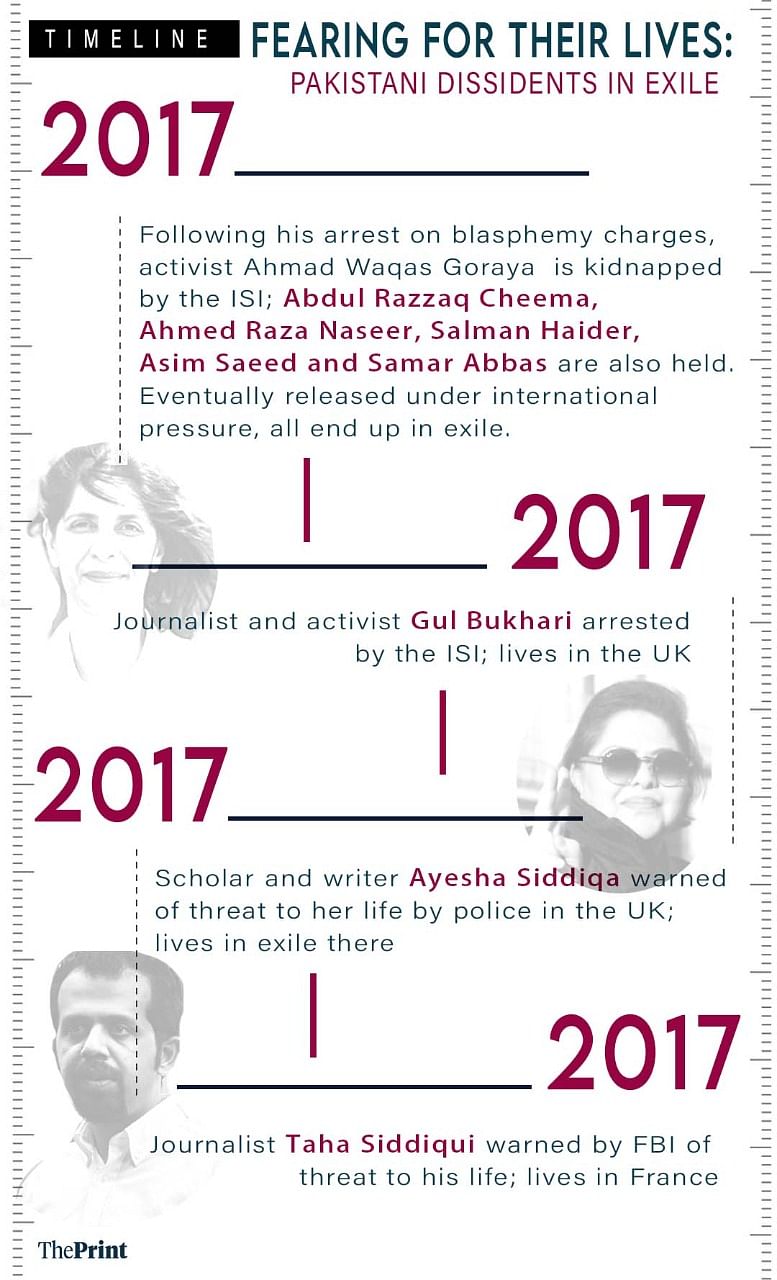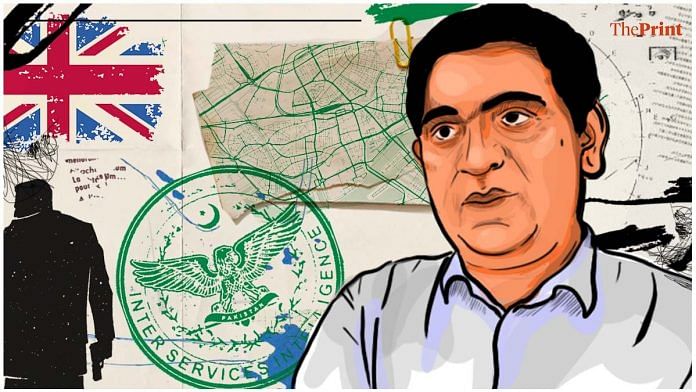New Delhi: For days on end in the summer of 2021, Muhammad Gohir Khan lurked in the shadows of a low-rise apartment block in Rotterdam’s unglamorous Mathenesserweg, nursing a €9.99 paring knife he’d bought in the hopes of transforming himself from a £11-an-hour delivery driver for Iceland Groceries into a highly paid professional hitman.
“I’m going to Rotterdam on work,” the father-of-six texted his wife just before he caught his flight from London in mid-June. “I love you”.
Last week, at the end of a two-week trial in the Kingston Upon Thames court, Gohir was found guilty of attempting to assassinate the Pakistani blogger and democratic rights activist Ahmad Waqass Goraya, who was imprisoned and tortured before facing fabricated blasphemy charges in 2017 and was forced into exile to the Netherlands the same year.
There’s a twist in the story, though, that is raising questions about what intelligence services in two continents knew about the attempt to kill the dissident. Four months before the would-be assassin arrived in Rotterdam, Goraya had been taken into protective custody by the Netherlands’ intelligence services, and put up in a safehouse along with his wife and two children.
Exactly how Dutch authorities came to know, back in February 2021, that Goraya’s life was in danger has not been revealed, nor have the possible perpetrators been named. And the United Kingdom, two sources familiar with the investigation said, is also yet to make a formal request to Pakistan to arrest the Lahore resident believed to have offered Gohir up to £100,000 to assassinate Goraya and other dissidents.
All this has led many to suspect that the conspiracy to assassinate Goraya might lead to Pakistan’s Inter-Services Intelligence (ISI). Goraya himself has no doubts about it.
“The successful trial of Gohir is just the end of a chapter, not the book,” said Ayesha Siddiqa, an exiled scholar and ThePrint columnist who was warned by United Kingdom authorities of a threat to her life in 2018.
“The British government must ensure safety of dissidents by demanding answers from Islamabad about uncovering Gohir Khan’s handlers,” she added.
Also read: Pakistan Taliban ex-spokesperson who fled says ISI forced him to lie about India ‘terror funding’
Close friendship, collapsed finances
Large parts of the case rested on WhatsApp exchanges between Gohir and a Pakistan resident who he identified as Muzammil Qamar, a 49-year-old resident of Lahore, who paid a £5,000 advance to Gohir and offered him thousands of pounds to execute a string of killings targeting Pakistani dissidents.
British authorities have declined to name Qamar as a suspect, saying only that investigations are ongoing, and no formal request has been made for his arrest, sources said.
Even though Gohir claimed, at his trial, that he was trying to fool ‘Mudz’, and take revenge for a business relationship gone sour, their messages suggest close friendship. The two men exchanged jokes about maulvis, discussed theology, and Gohir, at one stage, complained of being unable to find Halal food in Rotterdam.

The exact circumstances of the relationship remain unclear, but Qamar seems to have worked for some time at the Karachi offices of a cargo business owned by Gohir.
From 2019 on, as his family-owned Hajj-travel business collapsed, Gohir’s finances began to spiral downwards, and he was left with more than £204,000 in debt. Last year, a court declared Gohir bankrupt, after finding he had no means of paying back £153,000 to investors Funding Circle. Gohir also owed £45,000 to the United Kingdom government, loaned to him as part of a Covid-mitigation package.
‘Tuna, not a shark’
The two men, prosecutors say, began discussing the assassination plot in the autumn of 2020, with Qamar at one stage assuring his friend it only involved “a tuna”, not “a shark”.
Following receipt of the advance, Gohir flew to Rotterdam, attempting to evade Covid travel rules with a fake invitation letter from a friend. He was turned back by immigration authorities, but then entered the Netherlands via France, by road, spending a large part of the advance on hotels, car-rental and expensive meals.
Ironically, the would-be assassin seems to have staked out the wrong home, some blocks away from a flat where Goraya once resided. Following several failed attempts to locate the blogger — which included showing his photographs at a local café and Pakistani-owned business centre — a frustrated Gohir sent a video of the neighbourhood to be tallied with surveillance footage earlier sent to Qamar’s bosses. However, after a few days, he gave up and decided to return to the UK.
Was UK intelligence trailing Gohir?
The circumstances that led to Gohir’s arrest, though, raise intriguing questions. Following questions raised by immigration officials in Rotterdam on 23 June 2021, prosecutors said, authorities in the Netherlands asked Scotland Yard’s counter-terrorism authorities to investigate him further. Gohir, prosecutors went on, had handed over his Samsung Galaxy cellphone to Scotland Yard on his return from Rotterdam, though he declined to disclose the code used to unlock it.
Forensic experts, prosecutors said, were able to decyrpt the phone the next day, and retrieve WhatsApp messages that established the assassination conspiracy between Gohir and Qamar. Gohir was then arrested on 23 June.
In the trial, however, the police did not offer evidence on what Gohir might have said in Rotterdam that led immigration officials to flag him as a potential terrorism suspect, and why police in the Netherlands did not question him if they thought he posed a threat.
Lack of transparency on the intelligence that led to Goraya being moved into protective custody — along with the lack of action against Qamar’s bosses — has fuelled suspicion that Britain’s intelligence services may be reluctant to disclose all they know about the role of Pakistan’s Inter-Services Intelligence Directorate in the assassination attempt.
“There is no doubt in my mind that the attempt to assassinate me was conceived and executed by Pakistan’s intelligence services”, said Goraya. “The full truth of who ordered my killing and why is yet to emerge.”
Attacked, threatened last year
Investigators have also not located the individual who conducted video surveillance of Mathenesserweg — where Goraya and his family are known to have visited a friend on occasion — although the trial showed the street was covered by at least three closed-circuit television cameras.
The intelligence that led to Dutch authorities shifting Goraya and his family, the sources said, emerged from a surveillance operation targeting a trans-border narcotics syndicate believed to be running drugs into the port of Rotterdam.
Following the removal of the Goraya family to the safehouse, a source said, at least one individual linked to the assassination plot visited the Netherlands, and attempted to locate the target.
Last year, Goraya told the Dutch police that he was attacked by a man who appeared to be ethnic Pashtun, who threatened to kill him, and warned that he knew where his family lived. No arrests were made on that occasion.
“I’m delighted the man who tried to murder Goraya had been found guilty,” said Gul Bukhari, a journalist illegally held by the ISI in 2018, and now living in London.
“The men behind the attempts to kill him and other Pakistani dissidents are still at large, though, and it’s important countries like the United Kingdom make clear there will be consequences if they continue to operate with impunity,” she added.
(Edited by Saikat Niyogi)
Also read: Pakistan’s ISI reviving Khalistan groups with D Company funds, Delhi Police says



